Drug dispensing robot hailed as 'ground-breaking'
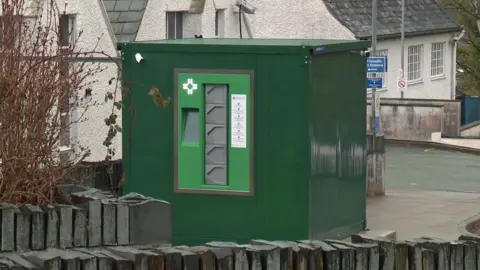 BBC
BBCA new robotic machine which allows patients to collect urgent medication when local pharmacies are closed has been hailed as ground-breaking.
The REMEDY machine, described as the first of its kind in Europe, will be trialled in Dolgellau, Gwynedd, where locals face 50 mile (80km) journeys to access pharmacies which stay open overnight or on Sundays.
People who contact NHS 111 out-of-hours and require medication urgently will be given the option of collecting their prescriptions from the machine, which is positioned outside Dolgellau Hospital.
"This is ground-breaking technology, using it for this purpose has never been done in Europe. This is world-leading," said Dr Rebecca Payne, a GP involved in the trial.
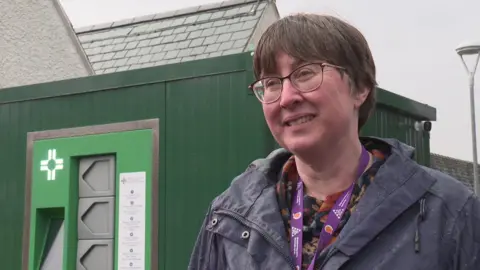
Dr Payne co-led the study to develop the trial alongside Prof Dyfrig Hughes, from Bangor University.
"[The machine] is developed to issue medication after a teleconsultation," said Dr Payne.
"We know that 70% of people who call 111 are managed by phone, but actually, if you live somewhere like Dolgellau, where there is no pharmacy open overnight or on a Sunday, it's really hard to get access to medication.
"It's so exciting that academia can come together with the health service and industry to meet a real patient need."
How does it work?
The machine stocks a variety of antibiotics, steroids and inhalers.
Dr Adam Mackridge, from Betsi Cadwaladr health board, said it was "quite simple" for patients to use.
"A clinician like myself working in 111 would speak to a patient and clinically assess them," said Dr Mackridge.
"If they needed some medication, then I can log into the machine remotely, it generates a pin code which we read out to the patient and also text to them.
"The patient then comes to the machine, puts that pin code in and it will issue the medication I've selected."
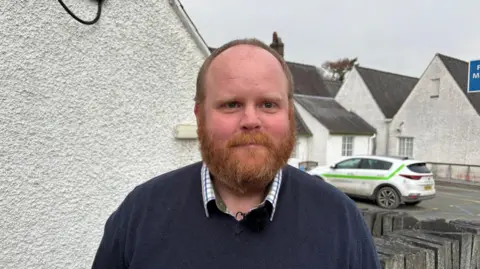
"People in this area, who live here or are holidaying in the area, historically would have to travel long distances to see a GP out-of-hours," said Dr Mackridge.
"But over the past few years we've been able to offer more teleconsultations so we can support people closer to home, which has been brilliant in many respects.
"But we've got that challenge about how we get medicine to those people, even though they've been clinically assessed remotely.
"At the moment, prior to the machine coming here, patients would have to travel potentially as far as Bangor (50 miles away) to be able to access medicines when the pharmacies in the area were closed."
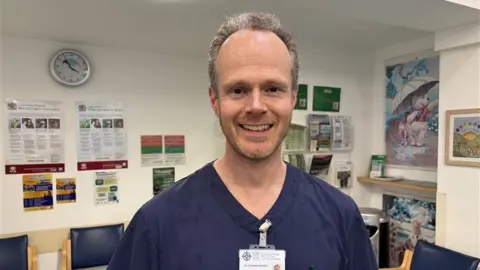
Dr Jonathan Butcher, who works as a local GP in Dolgellau, said the new machine meant people would no longer have to wait to collect their medication.
"That will help them feel better quicker," he said.
"Not everyone can travel or drive the long distances in the evenings or on weekends to find a pharmacy that's open."
Dr Butcher said the prospect of travelling a long way for a prescription meant some patients "did not seek healthcare when they needed it".
"This is going to be a good opportunity, and if people realise that they can get the medication just round the corner in the town, that is going to be fantastic for them."
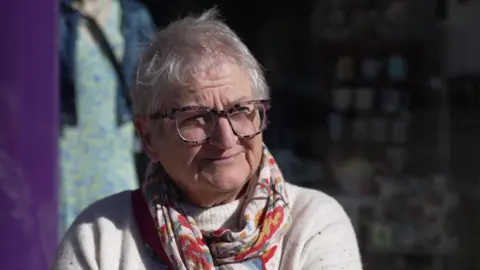
Jane Jardine, who lives in the surrounding area, said it had been a struggle to get hold of medication.
"It's a nightmare trying to get medication and see a doctor and stuff, so I think [the machine] is a brilliant idea," she said.
Llinos Rowlands, who lives in Dolgellau, also liked the idea of the new machine.
"It has to be a good thing, if it brings in medicine at no extra cost and helps people, it's a good thing," she added.
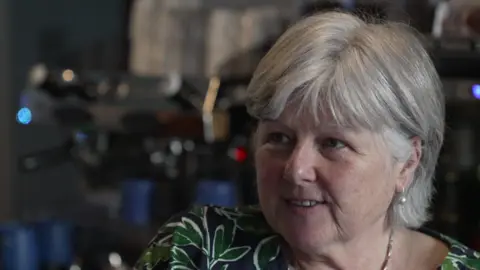
"'I've been lucky with my health... but I'd be very grateful to have something like this in the area if I needed it," she added.
"There is quite an older community in Dolgellau and it's a long way to travel an hour to get medicine, so it makes a big difference, not to mention the additional cost of having to travel, or some people not driving and having to catch a bus. And that's not going to be easy for someone who is not in the best of health."
The REMEDY machine, a joint project between Betsi Cadwaladr University Health Board and Bangor University, and funded by Health Care Research Wales, will be in operation for a two-year trial period.
